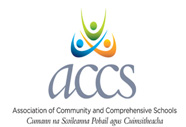Our Vision for Digital Learning and Teaching
Our School Vision for Digital Learning and Teaching
Our school recognises the importance of integrating ICT into learning and teaching in order to equip and prepare our students to live and work in a 21st Century Society. Our eLearning mission statement reads as follows:
John the Baptist Community School is committed to realising the potential of digital technologies
to enhance and deepen teaching, learning and assessment so that our students can develop a set of broad transferable skills
which enable them to participate fully in modern 21st century society and the economy.
In order to achieve this, we must provide suitable structures, resources and skilled personnel to ensure that our students have the opportunity to develop a range of key skills throughout their post-primary school journey. We must ensure, that at the end of the Senior Cycle, students have acquired key skills and a solid foundation of ICT competencies that will support their learning and transition to further or higher education.
In order to realise this vision, it is important to recognise the role of students, teachers, school leaders and parents/guardians. Future planning will take place with an acknowledgment that each group’s role is varied and significant.
Students
- Use ICT to open up new forms of learning and collaboration to support different styles of learning.
- Experience joy, satisfaction, passion and success in their education and lifelong learning.
- Actively engaged in learning – both in and out of school.
- Accepting ownership of their learning – involving the ability to be self-directed, a decision maker and a manager of priorities in and out of school.
- Using technology to achieve personal learning goals and to succeed in various learning activities.
- Using ICT critically, ethically and responsibly.
Teachers
- Taking a more facilitative role, providing student-centred guidance and feedback, and engaging more frequently in exploratory and team-building activities with students.
- Using ICT to “support an enquiry process and enable their students to work on solving complex real-world problems” by engaging in “collaborative project-based learning activities that go beyond the classroom”
- Supporting students to create and innovate so that they are engaged in managing their own learning goals and activities.
- Accepting ownership of their own professional learning and, where appropriate, designing and participating in learning communities that make extensive use of technology.
School Leaders
- Taking a lead role in planning how they will effectively embed ICT in teaching, learning and assessment practices. This means involving the entire school community in developing an e-Learning plan that takes into account the CPD needs of teachers, and the views and insights of students and parents/guardians.
- Developing policies and practices for the safe and ethical use of ICT by all members of the school community.
- Strengthening their existing relationships with the wider community, both local and global, and in particular, connecting more with parents/guardians and students in their homes through the use of digital technology.
Parents/Guardians
- Engage with their children’s learning through the use of digital technologies.
- Collaborate with and participate in school activities and programmes using ICT.

